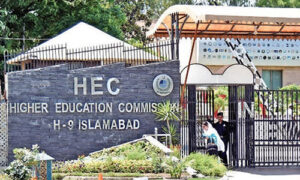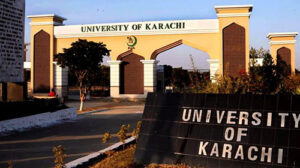“Civilization is in a race between education and catastrophe.”
— H. G. Wells
Today, a major question before thinking people is the following: Is higher education a means of investing in the younger generation, or is it simply a means of benefiting a few fat cats?
This is not a theoretical discussion. It represents a real struggle between the two major ways in which education has been approached in Pakistan. The first view emphasises competence or the substance of education, i.e., what you know, what you can do, and what your abilities are. The second view stresses entitlements, i.e., who is entitled to particular jobs or benefits, and who is excluded. In this view, it doesn’t matter whether you know anything relevant (or anything at all); what matters is whether you possess the necessary entitlement.
The entitlements perspective has, unfortunately, become entrenched unconsciously in our society. It was adopted deliberately in the early years of the HEC, and is being aggressively promoted by a number of people, including one of my predecessors as HEC Chairman. Thus far, it has resisted all attempts to replace it with a competence-based approach.
The principal strategy of the entitlements approach is expansion — more universities, more degree programmes, including PhD programmes, more faculty members with PhDs, more journals, more research papers, and more development projects — in part to obscure and justify the complete disregard of quality or substance.
Today, we certainly have more universities and more degrees and more research papers, but not more education, more knowledge, or more solutions. The degrees are of low quality, many graduates find themselves to be unemployable, most research papers are worthless, PhD dissertations are plagiarised, academic journals are fake and predatory, and public money is wasted.
As an aside, the focus on expansion is attractive not only because it creates the illusion of progress, even if the so-called progress is worthless, but also because expansion activities are carried out through new development projects, which allow for greater discretion in the spending of money and are, therefore, far more attractive to corrupt officials.
Building competence is difficult. It needs more and sustained effort. It does not provide the same opportunities for corruption.
Be that as it may, the entrenchment of the entitlements approach has created a deep-seated crisis in education. Universities have become degree mills, preoccupied not with providing education, but only with distributing degrees. The value of Pakistani degrees has plummeted to an all-time low. Employers complain consistently about the lack of preparedness and low skills and competencies of fresh graduates. (Interestingly, the only exceptions are the two degrees, namely engineering and medicine, which are effectively overseen by other regulatory bodies and not by the HEC).
Less than three percent of the candidates are able to pass the civil service exam, and only two percent of fresh PhDs were able to achieve satisfactory scores in an assessment examination conducted recently by the HEC for the selection of postgraduate fellows. Graduates find it difficult to get admitted to postgraduate programmes in top quality foreign universities. Many have acquired the degrees, but not the education.
Ironically, one of the HEC’s achievements was to control the proliferation of fake degrees by establishing an attestation system. However, what has happened in the process is that the quality of degrees has fallen so low as to make them accessible to everyone regardless of their merit or hard work.

The rot doesn’t stop there. The situation in research is equally dismal. Notwithstanding the expenditure of tens of billions of rupees, only a minuscule component of the research conducted at Pakistani universities is of acceptable quality. Once again, research is viewed not as a means of expanding the sphere of knowledge, but of gaining entitlements: jobs, promotions, allowances, awards, prizes, or tenure. Much of the so-called research published is in poor quality and predatory journals with low readership, and has no impact whatsoever on social or economic conditions, let alone the discipline it claims to advance.
Senior researchers are known to require junior researchers and students to add their name as co-authors on their publication. This has allowed some egregious individuals to claim thousands of papers written by their students as their own. In a notorious case, the head of a prominent research institution announced a grant of Rs. two lakhs for any researcher who published a paper in a list of accepted journals (including journals clandestinely managed by him). In the event, 36 researchers published papers, all of which included the institutional head as a co-author. The result? The institutional head allocated Rs. 72 lakhs to himself!
Incidentally, the above example pertains to the best-funded research institution in the country, with a mandate to conduct research on medicines and vaccines. It has merrily devoured over 40 billion rupees in the last two decades, but has not been able to produce a single medicine or vaccine. Yet, it has successfully resisted every attempt to assess its performance. Once again, it is concerned not about substance, but about entitlements.
More generally, funding to the HEC as well as funding by the HEC was effectively decoupled from substance, and in fact, made highly discretionary and ad hoc, thus making universities completely beholden to the HEC staff.




The entitlements approach poisons the future of researchers and faculty members. They are asked to chase superficial standards — the number of papers in journals of variable quality, rather than the academic excellence or societal relevance of the research. It ignores education totally. Faculty members are not expected to meet any standards regarding the quality of education they provide. Most educational programmes use outdated curriculums and syllabuses, with equally ancient textbooks, and with no mechanisms to ensure the pursuit of excellence.
All this has forced students, researchers, and teachers into a dead end of mediocrity. It has also given enormous discretionary powers to university administrations to dominate, discriminate, and play favourites with faculty members.
Sadly, many people seem to have forgotten how to talk about substance. A prominent so-called scientist brags incessantly about all the obscure awards and prizes he has received, and all the alphabets he can attach to his name, but never ever once about any scientific discovery he might have made.
Similar tinkering was done with the assessment of universities. The HEC developed a ranking system for universities, but the hodgepodge of criteria, most of them of dubious merit and unclear relevance to the quality of outcomes, turned it into a political tool rather than an academic one. Not surprisingly, it produced some odd results. Iqra University is ranked above LUMS, and Arid University Rawalpindi (and several others) had higher scores than Aga Khan University.
In short, the system has robbed us of the capacity to define quality. In every single instance, it has replaced quality and substance with a kind of meaningless mumbo jumbo. So instead of education, degrees, instead of research, bean-counting of papers of dubious quality in dubious journals, instead of scholars with insight, erudition, and integrity, there is an entire generation of people whose main skill is knowing how to milk the system.
The Higher Education Commission (HEC) was established nearly two decades ago in 2002. This is a good time to look back at its performance. The policies and programmes introduced in its early years should have produced results by now. An assessment of the results can trigger a search for new directions.
The results represent an unmitigated disaster. They constitute a violation of the rights of students who deserve to get the best education that the country can provide. They have wasted scarce national resources on spurious research while major societal questions go begging for answers. They have left us adrift in a world where all societal goals — be they economic growth, social equity, environmental conservation, protection of human rights, exercise of democracy, or national security and sovereignty — depend critically on the quality of education.
This crisis can be overcome. Although this is a society-wide problem, and will need a sustained, broad-based social campaign to overcome it, a start can be made by looking at the HEC, especially since the crisis was produced by ill-advised HEC policies.
The best approach to overcoming the crisis is to shift from an entitlements-based approach to a competence-based one.
This is precisely what was started at the HEC in 2018.
First, in order to incentivise universities to focus on the substance of education rather than merely the provision of degrees, HEC replaced the past ad hoc regulations with clear and coherent policies on both undergraduate and PhD degree programmes. These policies were based on a review of international best practices, and an assessment of the competencies required for future success, including in particular, “civilisational knowledge” and “practical knowledge”.
Second, in order to incentivise faculty members towards the pursuit of substantive goals, a programme of continuous professional development (CPD) was designed under the aegis of a new institution, NAHE, established specifically for this purpose. This has been coupled with the reform of the faculty assessment system to include substantive goals for teaching as well as research impact, instead of the bean-counting in vogue earlier.
Third, in order to encourage the pursuit of excellence in academic publishing, the journal recognition system was revamped from top to bottom, fraudulent and predatory journals were being weeded out, and technical support programmes were initiated.
Fourth, in order to incentivise universities into sponsoring meaningful research, the system of research funding and research management was reformed. Funding was linked to performance as well as to the success in addressing critical societal challenges and outstanding research questions.

doctorate holders.
Fifth, in order to enhance university autonomy and efficiency, a systematic commitment to transparency was introduced, including the establishment of a Higher Education Data Repository (HEDR) and Higher Education Management Information System (HEMIS). University funding is linked directly to performance.
Sixth, one of the weakest links in the chain was the low level of professionalism at the HEC itself, in which recruitments and promotions had been based almost entirely on the entitlements approach. A competency-based recruitment and promotion system was being introduced, the use of information technology was expanded (including the adoption of e-Office and SAP-based management systems), and regulatory systems streamlined.
Seventh, and most important, in order to ensure that the central focus on student welfare is not obscured by myriad policies and procedures, work has started on developing a student handbook, including policy objectives, descriptions of students’ rights (e.g., scholarships, privacy, safety, protection from harassment, or the rights of disabled individuals), legal obligations of educational institutions as well as governments, and institutional arrangements for protecting rights and ensuring the fulfilment of obligations.
These changes, and others, which cannot be listed in full in a short article, are just a start. The ultimate objective is to transform the education system from a patronage arrangement that benefits a few individuals to one that prioritises the rights of students to get the best education that the country can provide.
H. G. Wells once said, “Civilisation is in a race between education and catastrophe.” It is a race we cannot afford to lose. As our beloved country lurches from one catastrophe to another, it is perhaps time to remember these words and start investing in education.

The writer is one of Pakistan’s leading academics, who served as the fourth chairman of the Higher Education Commission (HEC).

